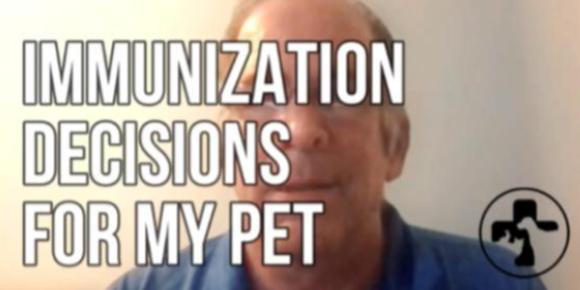A Holistic Approach to Pet Health: Immunization Insights

A Holistic Approach to Pet Health: Immunization Insights
- posted: Oct. 03, 2023
- Pet Immunization
Hello, I'm Dr. Michael Dym, a holistic veterinarian in West Palm Beach, Florida. Today, I want to discuss a crucial topic in veterinary medicine: immunization. This is a controversial issue, and I hope to provide you with some valuable insights to help you make informed decisions about your pet's health.
The Overuse of Immunizations
Immunizations have been a cornerstone of preventative medical treatment in the veterinary profession for decades. However, the practice of administering them every year or every three years is outdated. Research by Dr. Ron Schultz, a prestigious immunologist, has shown that immunity to core viral diseases can last for years, if not a lifetime. Despite this, over 60% of veterinarians still vaccinate pets annually.
Tailoring Immunizations to Individual Pets
Immunization should be an individualized process. Factors like whether your pet is indoor or outdoor, their breed, and their lifestyle affect their risk of infectious diseases. Smaller dogs, for instance, may not need the same dose as larger breeds. Dr. Jean Dodds conducted a study on smaller vaccine doses for smaller animals, which proved effective and safer.
Understanding Immunization Reactions
Immunization reactions can occur hours, days, or even years after vaccination, despite the immediate absence of symptoms. Cats, for example, can develop sarcomas (aggressive cancers) at vaccination sites. Reactions are more common with killed viral vaccines due to added adjuvants and heavy metals.
Balancing Gut Health
An imbalanced gut can increase the risk of immunization reactions. A healthy microbiome is crucial. Neutered or spayed animals are more prone to reactions, so maintaining sex hormones can be beneficial.
Immunization Reactions and Their Effects
Immunization reactions can affect various organ systems. Dr. Larry Glickman's research showed that some animals developed antibodies against their own tissues after multi-component vaccinations. This increased the risk of autoimmune diseases.
Chronic Immunizations
Chronic symptoms can occur after immunizations, mimicking the diseases they protect against. For example, rabies-immunized dogs may develop neurologic disorders and behavioral changes. This is a concerning issue.
Selecting the Right Immunizations
Core vaccines like Parvovirus and Kitty Panleukopenia may be necessary for puppies and kittens. However, non-core vaccines like kennel cough, Lyme disease, leptospirosis, and canine influenza are often unnecessary and potentially unsafe.
Alternatives to Immunizations
Titers: These measure antibody levels and can indicate protection. Immunity from earlier shots can last for many years, making annual immunizations unnecessary.
Homeopathic Nosodes: These are prepared from diseased products but are diluted and prepared homeopathically. They offer a safe alternative to immunizations.
Diet and Nutrition: A well-balanced diet plays a vital role in pet health. Good nutrition can strengthen your pet's immune system, reducing their susceptibility to diseases.
Protecting Against Immunization Reactions
For pets that do receive immunizations, certain homeopathic remedies can help reduce the risk of reactions. Liver detox treatments, antioxidants, and immune-modulating agents like DMG can also be beneficial.
Conclusion
In conclusion, immunization is a complex and critical aspect of pet health. It's essential to tailor immunization schedules to individual pets, avoiding unnecessary and potentially harmful vaccines. Consider alternatives like titers and homeopathic nosodes. Focus on a balanced diet and overall well-being to keep your pet healthy. If your pet experiences immunization-related issues or if you want to prevent them, consult with a holistic veterinarian for guidance.
Thank you for taking the time to explore this important topic with me.

A Holistic Approach to Pet Health: Immunization Insights
- posted: Oct. 03, 2023
- Pet Immunization
Hello, I'm Dr. Michael Dym, a holistic veterinarian in West Palm Beach, Florida. Today, I want to discuss a crucial topic in veterinary medicine: immunization. This is a controversial issue, and I hope to provide you with some valuable insights to help you make informed decisions about your pet's health.
The Overuse of Immunizations
Immunizations have been a cornerstone of preventative medical treatment in the veterinary profession for decades. However, the practice of administering them every year or every three years is outdated. Research by Dr. Ron Schultz, a prestigious immunologist, has shown that immunity to core viral diseases can last for years, if not a lifetime. Despite this, over 60% of veterinarians still vaccinate pets annually.
Tailoring Immunizations to Individual Pets
Immunization should be an individualized process. Factors like whether your pet is indoor or outdoor, their breed, and their lifestyle affect their risk of infectious diseases. Smaller dogs, for instance, may not need the same dose as larger breeds. Dr. Jean Dodds conducted a study on smaller vaccine doses for smaller animals, which proved effective and safer.
Understanding Immunization Reactions
Immunization reactions can occur hours, days, or even years after vaccination, despite the immediate absence of symptoms. Cats, for example, can develop sarcomas (aggressive cancers) at vaccination sites. Reactions are more common with killed viral vaccines due to added adjuvants and heavy metals.
Balancing Gut Health
An imbalanced gut can increase the risk of immunization reactions. A healthy microbiome is crucial. Neutered or spayed animals are more prone to reactions, so maintaining sex hormones can be beneficial.
Immunization Reactions and Their Effects
Immunization reactions can affect various organ systems. Dr. Larry Glickman's research showed that some animals developed antibodies against their own tissues after multi-component vaccinations. This increased the risk of autoimmune diseases.
Chronic Immunizations
Chronic symptoms can occur after immunizations, mimicking the diseases they protect against. For example, rabies-immunized dogs may develop neurologic disorders and behavioral changes. This is a concerning issue.
Selecting the Right Immunizations
Core vaccines like Parvovirus and Kitty Panleukopenia may be necessary for puppies and kittens. However, non-core vaccines like kennel cough, Lyme disease, leptospirosis, and canine influenza are often unnecessary and potentially unsafe.
Alternatives to Immunizations
Titers: These measure antibody levels and can indicate protection. Immunity from earlier shots can last for many years, making annual immunizations unnecessary.
Homeopathic Nosodes: These are prepared from diseased products but are diluted and prepared homeopathically. They offer a safe alternative to immunizations.
Diet and Nutrition: A well-balanced diet plays a vital role in pet health. Good nutrition can strengthen your pet's immune system, reducing their susceptibility to diseases.
Protecting Against Immunization Reactions
For pets that do receive immunizations, certain homeopathic remedies can help reduce the risk of reactions. Liver detox treatments, antioxidants, and immune-modulating agents like DMG can also be beneficial.
Conclusion
In conclusion, immunization is a complex and critical aspect of pet health. It's essential to tailor immunization schedules to individual pets, avoiding unnecessary and potentially harmful vaccines. Consider alternatives like titers and homeopathic nosodes. Focus on a balanced diet and overall well-being to keep your pet healthy. If your pet experiences immunization-related issues or if you want to prevent them, consult with a holistic veterinarian for guidance.
Thank you for taking the time to explore this important topic with me.
Office Hours
Monday
9:00 AM - 8:00 pm
By Appointment Only
Tuesday
9:00 AM - 8:00 pm
By Appointment Only
Wednesday
9:00 AM - 8:00 pm
By Appointment Only
Thursday
9:00 AM - 8:00 pm
By Appointment Only
Friday
9:00 AM - 8:00 pm
By Appointment Only
Saturday
By Appointment Only
Sunday
By Appointment Only

